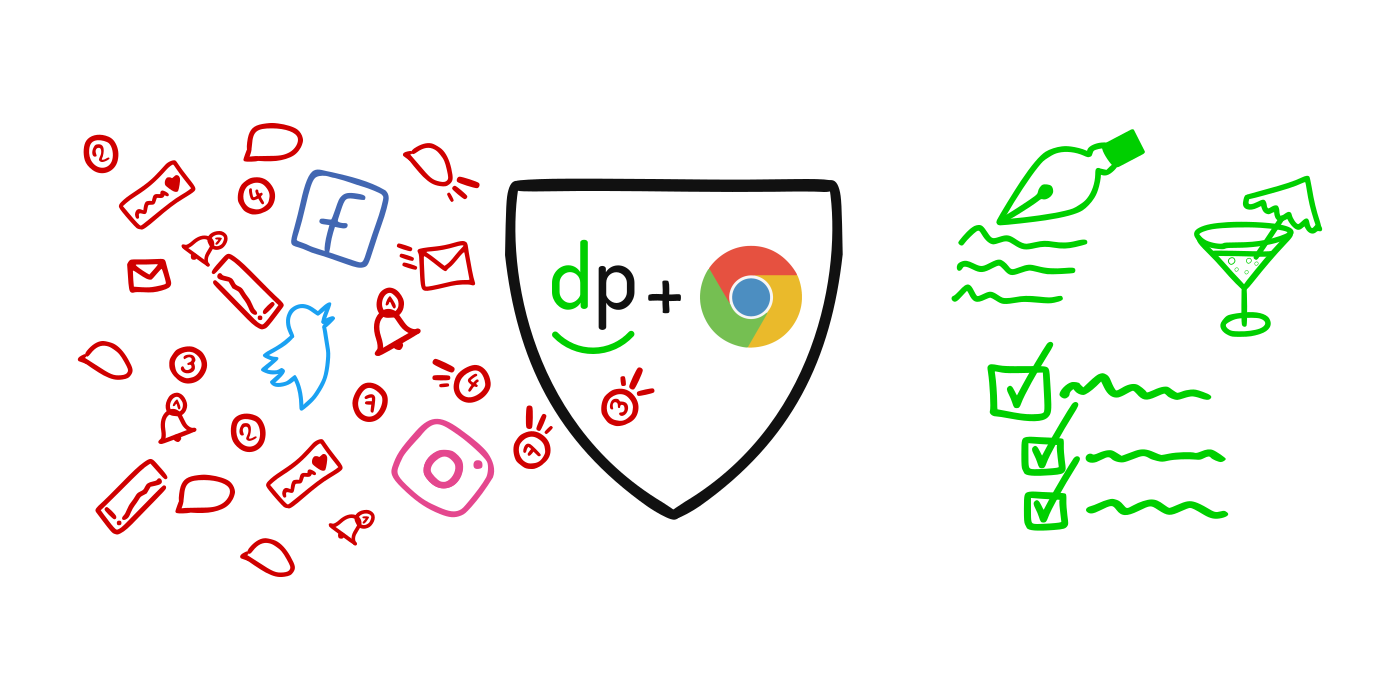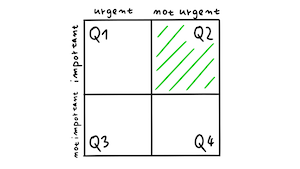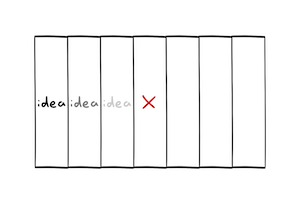What is procrastination and why we do it
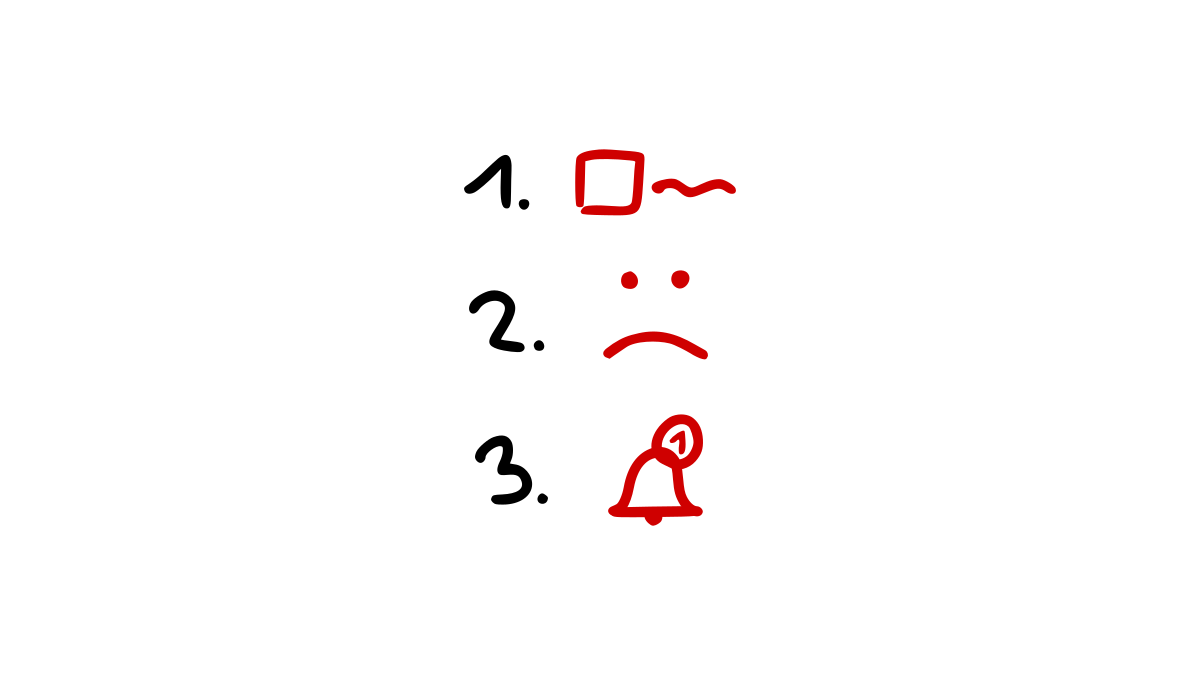
If you want to know how to stop procrastinating, you need to understand why you procrastinate in the first place.
The dictionary definition of procrastination is delaying a task—but what good does knowing that do us?
Here’s our definition:
Procrastination
= a short-term escape from stress associated with a task or a decision.
Procrastination is not the problem. It's a tactic we use to make ourselves feel better. It’s a symptom of temporary or deeper psychological issues.
Let's go into detail.
1. You encounter a task:

2. You feel stressed about it for some reason. You feel bored, uncomfortable, or uninterested.
You don’t feel like doing it.

3. To avoid those negative emotions, you do something else instead: watch TV shows, check your phone, eat some food, tidy up, bake,... anything that makes you feel better immediately.
That’s the basic procrastination dynamic. You may be familiar with it.
Often, we do all these 3 steps subconsciously.
Unfortunately, this process can turn into a habit that gets reinforced every day.
The Procrastination Habit Explained
Here's the general recipe for procrastination:
Think about a task
"I have to do _____."Have an automatic negative reaction
- Negative thoughts
"I have so much to do." "I hate doing this." - Negative feelings
Feeling stressed, afraid,...
- Negative thoughts
Procrastinate
Do something else to feel better.
Procrastination is all about escaping negative emotions.
Something makes you feel bad, you do something else to feel better.
Feeling better (reduced stress and unease) is the short-term reward engaging in procrastination.
That's why procrastination can become addictive and why it becomes a habit for many people.
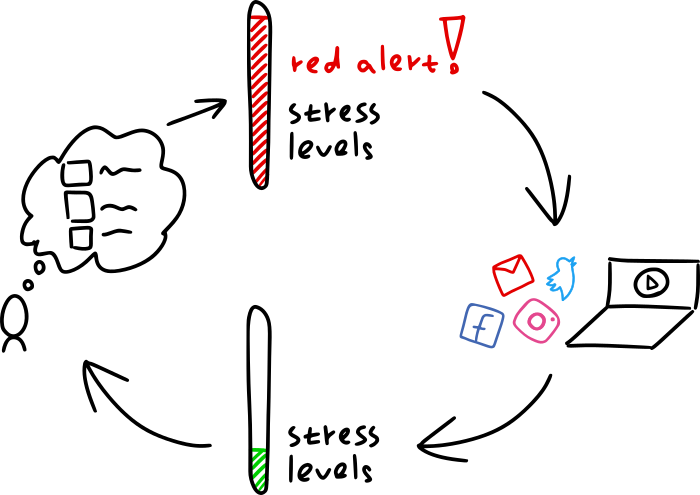
Now we’ll dive into each of the 3 basic steps to procrastination.
Step #1: Task
This is straight-forward.
You think about a task, or you see a to-do item on your list, or someone sends you an email... That triggers feelings of stress, unease, or discomfort for some reason.
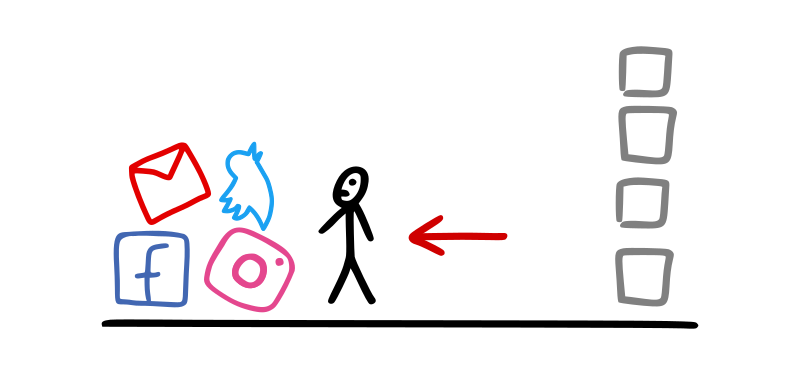
Step #2: Automatic negative reaction
This is a more interesting step.
This negative reaction typically takes 2 forms: feelings and thoughts.
Negative reaction: feelings
Feelings come immediately.
Feeling bad can take many forms, you can feel:
- stressed,
- uneasy,
- guilty,
- afraid,
- ashamed,
- ...
Or you can feel physical tightness in your stomach, or chest.
These negative feelings can push us to reach for the phone, or open a new tab, or clean the room - often before our conscious mind had a moment to react.
The initial negative wave can pass quickly. If we let it.
Negative emotions typically last only about 90 seconds. That's it. If you sit and do nothing, the feeling will pass.
Unfortunately, we often prevent that process.
Instead, we attach a negative thought to the feeling and turn it into a mood.
Negative reaction: thoughts
I hate doing this.
I don't want to do this.
It's so hard.
I don't know where to start.
I don't feel like doing this.
I have so much to do.
I really should do it. Now.
All of these thoughts contribute to procrastination.
They stress us.
They make us hate the task even more.
They increase the psychological resistance we feel toward it.
When we don’t catch ourselves and realize what we’re doing and how we’re making the problem worse, we continue smoothly to the Land of Procrastination.
Step #3: Procrastination
The final step of the process is procrastination itself.
We do something less stressful and less uncomfortable than the original task, and get a temporary sense of relief.
Procrastination can take many forms, you can procrastinate by:
- scrolling on your phone
- checking the news in your browser
- tidying up,...
- going to look for a snack, again
- reading irrelevant articles on Wikipedia
There are billions of ways to procrastinate, so we won't try to list them all. What they all have in common is that they let you escape from stress.
However, there are 2 distinctions worth making.
First, procrastination can be:
Unproductive
Unproductive prorcrastination means that we do things that achieve nothing and leave us feeling worse than when we started.
Social media falls into this category.Productive
This type of procrastination is about getting things done, but not the things that truly matter.Doing unimportant work falls into this category.
Second, procrastination can be:
Addictive
Scrolling social media, playing online games, gambling...Not addictive
Tidying up, exercising, meditating,...
Unfortunately, many people choose the worst option—unproductive and addictive procrastination.
This is the worst type of it because it takes up all free time and leaves you feeling hollow and miserable.
Aim to not procrastinate, but if you do procrastinate, try to choose productive and non-addictive activities.
The Procrastination Habit - Summarized
A task (1.) triggers negative emotions (2.), which you escape by doing something else (3.).
The reward (= feeling less stressed/uneasy/bored...) is why procrastination becomes a habit.
All this often happens subconsciously.
We still haven't addressed one important aspect of procrastination:
Why do we have this negative reaction to certain tasks?
What causes procrastination
We procrastinate for a reason.
Or rather, reasons, plural.
There are 2 main types of reasons why we procrastinate:
Temporary reasons
- Being tired
"I feel so tired" - Being stressed
"What to do first? The deadline's tomorrow!!!" - Being overwhelmed
"There's so much to do" - Beating yourself up
"I'm so lazy" - Being over-stimulated or distracted
"Work is no fun after checking Youtube for hours"
- Being tired
Deeper reasons
- Being afraid of failure
What if I fail? - Being afraid of endless boring work
"I want to have fun. I don't want to be a workaholic." - Being afraid of being judged
"What if people don't like it?" - Being afraid of losing your autonomy
"I don't want to be told what to do."
- Being afraid of failure
The temporary reasons for procrastination can often be addressed in 15 minutes or an hour.
However, the deeper reasons can form a solid mental block for decades, if unexamined.

Now we see that procrastination itself is not the problem.
Procrastination is a symptom of other problems (temporary or deeper ones).
When you want to stop procrastinating, first find the underlying reasons why.
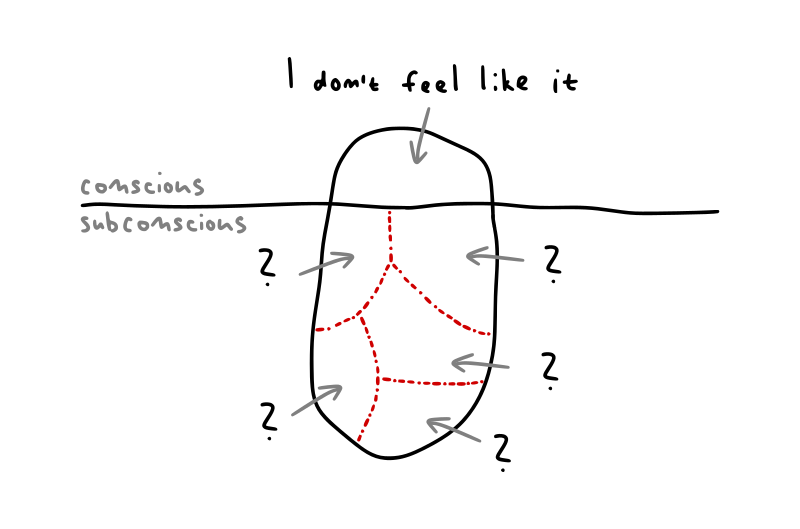
Why do you procrastinate?
What tasks do you put off? What tasks do you do easily? What’s the difference?
How could you address the underlying issues?
These kinds of questions will help you remove mental blocks and take action.
Now, we don't want to leave you without pointing you to some practical techniques that you can try today.
We've already covered many of the frequent causes here on our blog, so here are articles that can help you:
- If you're feeling overwhelmed, read this post.
- If you get distracted easily, see this post about checking your phone less or this post about allowing yourself to be bored.
- If you're afraid of failure, check out the sample chapter of our book on how to overcome the fear of failure.
- If you're afraid of success, see this post.
If none of the above apply to you, list through our blog and see if you can find what you need.
And if you want to read a comprehensive guide on how to overcome procrastination, no matter the cause, check out our book.
Thank you for your attention and we hope you find this useful.

